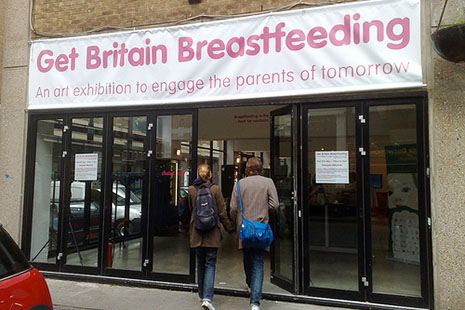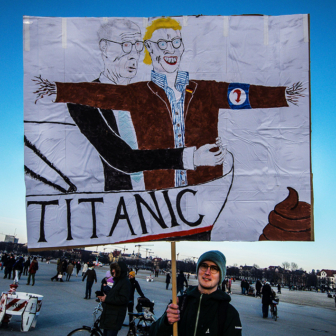A FEW YEARS ago Claire, an Australian woman in her early twenties, was enjoying a quiet moment in cafe in the affluent Cotswolds town to which she had recently moved with her husband. She had ordered something to drink, and was discreetly – a word that refuses to go away in British discussions of this subject – breastfeeding her baby daughter.
Claire’s peace did not last long. On this occasion it was disturbed not by the usual cries, screams and the like that torture the ears and nervous systems of new parents. Instead, a well-dressed middle-aged man approached Claire and asked her to stop breastfeeding her daughter. When I recently asked her about this experience, Claire recalled being “shocked,” “speechless” and “horrified.” She abandoned her drink at the table, put her daughter in the pram, and went straight home to endure her embarrassment in private.
After this humiliating experience, Claire refused to breastfeed her daughter in public again. And whereas she continued to breastfeed the daughter whose dietary habits had caused such offence until she was two-and-a-half, when Claire later had a baby boy she seriously considered only bottle-feeding. In any case, she weaned him at nine months, having endured much of that time in the isolation of her own central London flat for fear of finding herself far from home when her son needed to be fed.
Mission accomplished: and another blow in favour of a bottle-fed Britain.
In breastfeeding her son for as long as nine months, Claire had in any case endured far longer than the overwhelming majority of British mothers. While about four-fifths of British women try breastfeeding, only a few more than a fifth make it to six months. Although recent comparative statistics are hard to come by, these rates do seem to be trailing well behind many European countries, the United States and Australasia. Norway is frequently cited as the front-runner, where almost all mothers begin breastfeeding and eighty per cent of babies are exclusively breastfed at six months. In Australia, just under half of babies are still being breastfed at all at this age, a rate which has worried health authorities there, but it is still much better than Britain’s.
Claire’s experience helps explain why Britain does less well, and it’s supported by recent survey results that show almost two-thirds of British women felt too embarrassed to breastfeed in public, almost as many believed that there was unsympathetic environment for public breastfeeding in Britain, and over half had, like Claire, been asked to leave a restaurant or café while feeding a baby. Australian mothers living in Britain to whom I spoke were struck by the ubiquity of bottle-feeding, and the public invisibility of public breastfeeding compared with their homeland.
Claire’s experience is not unusual. Over the last couple of years there has been a steady stream of stories of this kind in the media. The issue of public breastfeeding is still capable of provoking the following intervention, which recently appeared in my own local paper, the Camden New Journal. The correspondent, one Jacqueline Castles, was responding to an article by a Greens representative on Islington Council in praise of breastfeeding as both natural and healthy for mother and child.
Ms Castles conceded that breastfeeding is “natural.” But, she continued, “So is urinating, fornicating and sporting an untrimmed beard. Breastfeeding in public space is forcing those sharing that space into the position of voyeur, unwittingly and unwillingly required to observe an intimate activity played out in public ... You do me violence when you seek to force me to witness your private acts, and this is why breastfeeding in public is not only narcissistic, but contemptuous of the feelings and indeed rights of others to enjoy public space unmolested.”
While these comments might seem just a bit creepy and best left to Jacqueline Castles, that they reflect a broader discomfort with public breastfeeding is beyond doubt.
Some mothers, it is true, report positive experiences. Sonia, another Australian living in London, has fed her daughter in parks, cafés, restaurants, pubs and a bookstore. She’s unable to recall any negative attention and thought that in Britain, people made a particular effort not to stare. Another London mum with whom I communicated felt that breastfeeding was so heavily pushed in London that it might be harder to feel justified in practising bottle-feeding. But there are also complaints about there being few places where mothers can comfortably feed their children when they are out and about. Your breastfeeding London mother soon becomes an expert on where – when she is out and about with her child – she can find comfortable facilities for breastfeeding, which cafés have quiet corners and comfortable chairs, which department stores pleasant cubicles, and so on.
There are also indications that the situation in London might not be representative of the country as a whole, and more favourable to the breastfeeding mum than elsewhere. Claire’s experience occurred outside the metropolis and another mother to whom I spoke, living in a conservative market town in Yorkshire, felt that she had been subjected to hostile stares while feeding her daughter on a park bench. She is also of East Asian background, and wondered whether that might have increased the sense of her being on outsider intruding on the public space of the more obviously “local.” A survey carried out by Mother & Baby magazine agreed that mothers breastfeeding in public were less likely to be challenged in London than in other regions.
There have been Breast-is-Best campaigns in Britain aimed at increasing the proportion of breastfeeding mothers, and in 2005 the Scottish government legislated to prohibit discrimination against public feeding. Scottish mothers are apparently more likely than their English counterparts to breastfeed their babies in public places and to feel relaxed about doing so. But the British government has also now decided to act, and an Equality Bill has now passed its second reading and is likely to come into force next year. Its explicit protection of public breastfeeding has been welcomed by organisations such as the National Childhood Trust.
Nevertheless, with the Labour government’s seeming capacity to spoil even the best idea, the Westminster legislation will only ban discrimination when the child being fed is six months or less, a qualification that appears to suggest that there is something not quite right about older infants being fed on the breast. One recently arrived Australian mother of my acquaintance was certainly given a slightly odd look when she revealed to a nurse in her local clinic that she was still breastfeeding her daughter at around eighteen months. Mothers who breastfeed at two are sometimes made to feel rather like freaks, despite World Health Organization recommendations about the beneficial health effects of breastfeeding for children up to this age.
To be fair, there is other British legislation, such as the Sexual Discrimination Act, that seems to provide breastfeeding mother with a degree of protection. But it is in the nature of issues such as this one that the messages being pumped out matter a great deal. It only takes a single junior manager, a tight-lipped prig, or – as revealed in a recent Australian case – an ignorant or inexperienced air steward to humiliate a young mother in a way that might reverberate in her own and her children’s lives for years. Even to imply that that the age of six months has such special significance that it should be enshrined in legislation is highly questionable and could conceivably create an impression that breastfeeding of older children can be treated as offensive.
The defence of public breastfeeding in this country puts a surprising and, I think, worrying emphasis on discretion. At times, it seems that the brief exposure of a bosom is deemed to be of far greater import than whether or not baby is happy and healthy. Mothers are not at fault for their preoccupation with this matter, and for their pained insistence that they are not flaunting it. They’re simply doing their best to defend public breastfeeding in terms that will be acceptable in a society anxious about the public display of flesh and nipple.
All of this in the nation that gave the world Benny Hill and the Carry On movies, and in which the country’s highest selling newspaper – brought to you courtesy of our very own Rupert – includes a women revealing her mammaries on its third page every day. No one seems to be much concerned about such newspapers being indiscreetly left lying around on trains – as they are. Nor, surprisingly, does anyone seem at all worried by the flamboyant eighteenth-century attitude to the display of cleavage that seems taken for granted in the daily life of the capital – even, remarkably, during temperatures that in Australia cause most sensible people to resort to a heavy jumper, if not a coat and scarf.
These double standards have not gone unnoticed here in the debate over breastfeeding. Men didn’t “mind them hanging out if it is one some leggy blonde in the paper or on the beach,” commented a woman named Charmaine on one blog. In the circumstances, it’s perhaps little wonder that women who seek to defend public breastfeeding in Britain lay so much stress on discretion, feel the need to explain to their grandmothers – as one women reported – that they’re not “one of those Germaine Greer types,” and spend so many words on the rather strange pre-Freudian project of demonstrating that breasts were really evolved only to feed children and have nothing to do with sex at all.
Page 3 of the Sun suggests otherwise, and on quite different grounds Melanie Klein would also beg to have differed. But perhaps none of this will take us very far in resolving the problems faced by breastfeeding mothers of young children in Britain. What might instead be needed is the kind of transformation in understandings of both civility and the public good that have underpinned changing attitudes to, and laws concerning, public smoking. Not much more than two years ago, Britons were still smoking inside pubs and restaurants. These days, it seems almost impossible to imagine that anyone ever did such a nasty thing.
A similar transformation will have been accomplished when the well-being of a hungry child, of whatever age, is seen as outweighing even the need for “discretion” in a breastfeeding mother. •




